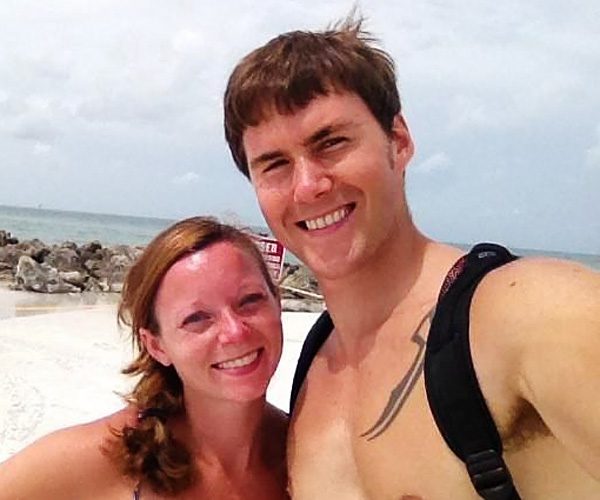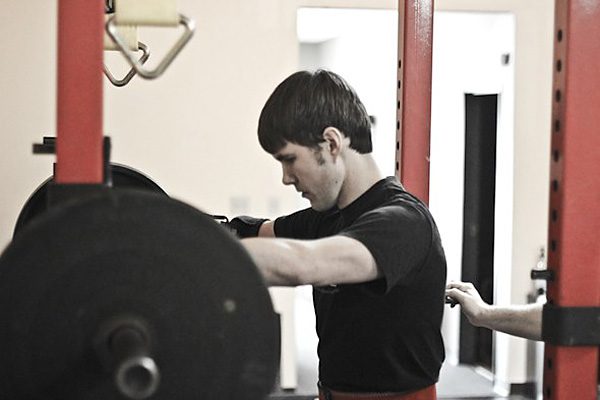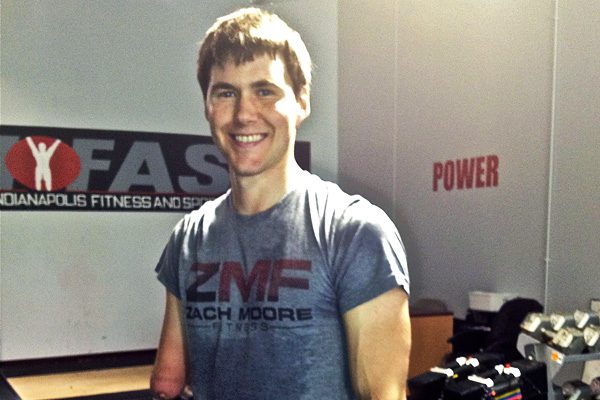I work with them every day, so I know how awesome Precision Nutrition’s coaches really are.
Today you get to meet one of them, Zach Moore.
+++
Back when Zach Moore was studying economics, he probably never imagined that its principles might apply to his future career of coaching. In fact, he didn’t even know he was going to become a coach. After all, it’s not a typical occupational choice for someone in academia.
But in his second year of graduate school, Zach made two important discoveries.
First, as a teaching assistant, he learned that knowledge was meant to be shared with others. And second, he joined one of North America’s most respected gyms – sparking an enduring passion for strength and conditioning training.
Economists like to talk about the importance of trade-offs: To get one thing, we usually have to give up something else. But Zach did something that economic theorists might find difficult to explain: He gave up a promising future in academia – one that he had plenty of incentive to pursue – in favor of a career path where the financial rewards were far from guaranteed, and he’d need to start again, from the bottom rung.
That takes courage, and initiative, and a quiet, stubborn kind of faith. Each of which Zach Moore displays in abundance.
Growing up in a small town in Indiana, Zach showed an early love of sport.
“My parents own roughly 150 acres. Going back there to visit brings back great memories of being a kid and playing outside – building four wheeler trails, fishing, and camping,” he says. “I’m a country boy at heart.”
In high school, he played football, tennis, and golf. In winter, it was snowboarding. He was game for anything that got him outdoors and moving.
Close to his family, surrounded by friends, at the age of fifteen Zach was also lucky enough to meet the love of his life, Emme. That gave Zach an exceptionally stable foundation.
So the next big development came as a bit of a surprise.
He went off to Hanover College, with a major in Economics – and a minor in disordered eating.
One key tenet of economics is the fallacy of single causation: There’s rarely a sole reason for any significant change. Sure enough, in Zach’s case, a whole lot of factors conspired to make him vulnerable.
“I was a very confident teenager,” he says. “I would even go as far as to say I was a little cocky. I had a lot of friends, was athletic, and made solid grades. So when I entered my freshman year of college, I felt confident. But I didn’t know anyone besides my girlfriend, her brother, and one other kid from my high school.”
Instead of living at home with his family, he was living in a dorm with a roommate. Instead of being surrounded by people he knew, he was surrounded by strangers. Instead of being recognized by his teachers, he was just one more youthful face in the crowd.
Loneliness. Familiar routines disrupted. New and challenging expectations, together with a growing awareness of just how little we really know and how much we have to learn; how big the universe is, and how small we are, in relation to it.
Zach is far from the only freshman to experience those feelings – and his response to them is also a lot more common than you might think. In fact, according to the National Eating Disorders Association, ten million boys and men will suffer from a clinically significant eating disorder at some point in their lives. And athletes are especially at risk.
For Zach, it came on slowly and at first appeared benign.
Having grown up on a diet of mostly processed foods, he’d never really considered the relationship between nutrition and health or body composition. “I’m not sure I even realized there was a connection.”
But in college, he began to notice and pay more attention to the fact that others ate differently from him.
His normal diet included a lot of burgers, fries, cereal, and grilled cheese sandwiches.
In fact, when he first started dating Emme, he thought her family ate “healthy” because they opted for Cheerios and Pop Tarts without icing. “No icing? What the hell!?”
But at the school buffet he saw that Emme and his roommate tended to choose different foods than he did. He decided that he’d also like to make some changes to improve his health.
He began by eliminating added fats.
“I’m not sure where I got the idea that fat was evil,” he says now, shaking his head. “In retrospect, it’s sort of hard to understand.”
However, by cutting back on fat, he started to see some ab definition. Surely that was a good thing? Besides, at that point, he wasn’t seeing any negative effects of his new diet. His grades were good, he was competing on the tennis team, and life felt fine.
Then, partway through his sophomore year, Zach transferred schools. And, as he says, that’s when things got “really ugly.”
He was living alone in an apartment in Indianapolis – cut off from community and friends. Now, for the first time, he had to buy and cook food for himself.
“I began to buy more and more of what I considered clean foods and stayed away from fat. I also restricted myself to very small portions. And I delayed my meals as long as possible.”
Lunch might be a container of low-fat yoghurt with some Cheerios thrown in. “If I had to estimate,” he adds, “I’d say I was eating about 1,000 calories a day. But I never counted because I didn’t even know what was a reasonable amount.”
Meanwhile, he underwent knee surgery for an old injury. That meant that he was far less active than he’d been in the past.
“My social life was nonexistent. I rarely went anywhere besides to class and to my apartment. I knew no one in Indy and made very little effort to change that.”
Looking back, Zach knows that he was severely depressed. But at the time, he couldn’t see it.
He avoided going out with friends. That would have meant less control over his diet. He even dreaded visits to his parents. They didn’t have what he considered “acceptable” foods in the house.
It may seem difficult to understand how a highly intelligent young man with a grade point average of 4.0 could fall into this kind of obsessive thinking. But depression has a way of clouding a person’s mind and tying it into peculiar knots. Starvation and malnutrition can have eerily similar effects. And by this time, at around 125 pounds on his 6′ 1” frame, Zach was nearly starving.
Luckily, his loved ones reached out to offer him support.
His parents and Emme sat him down for a very serious and emotional discussion.
It wasn’t an “intervention,” exactly – because by then, Zach understood he had a problem. He’d even started reading up on weightlifting and nutrition to try to find a way out of it. And besides, he trusted his parents and Emme. He knew they had his best interests at heart.
Still, it was pretty clear that he wasn’t going to be able to dig himself out of this mess on his own. So together, they decided on a plan of action. And Zach began to attend an eating disorders clinic as an outpatient once a week.
“I had access to a dietician, doctor, and a psychologist. Each week I reported my food log, checked my body weight, and talked with the psychologist about my struggles and successes.”
Slowly, he began to regain his health.
Yet emotionally, he also faced some blips and stumbles.
To begin with, while he trusted his parents and Emme, Zach didn’t always trust the dieticians and doctors at the clinic. And it seemed the mistrust was mutual.
“They wanted me to go back to eating the foods that I used to enjoy – cereal, burgers, whatever. They didn’t seem to care much about the quality of what I ate. They just wanted me to put the weight on.”
Zach, meanwhile, wanted to put on muscle instead of fat, and thought he had learned how to do that through a diet of mostly whole foods. His doctors interpreted his stance as evidence of orthorexia – an obsession with clean eating. Even though he was gaining weight, he wasn’t gaining fast enough to please them.
This led to a standoff.
Eventually, Zach left the clinic. Fortunately, by that time he was strong enough himself, and had the support he needed, to continue gaining weight in a healthy manner.
One of his inspirations was Dr. John Berardi.
“I stumbled onto John Berardi’s Scrawny to Brawny.”
Afraid the book was just another scam, he didn’t buy it right away.
“Instead, I began reading a lot of JB’s articles online. He was very similar to me – he had been scrawny and put on a bunch of muscle by eating a lot and training hard. He also has a PhD in nutrition, and his nutritional philosophy resonated with my own – focus on whole nutritious foods.”
The idea of being able to eat healthy and gain muscle sounded great to Zach.
There were only two problems.
First, by this time, he’d had two knee surgeries on the same knee, and neither had reduced his pain or improved his function. Second, he was born with only one arm, and therefore didn’t think he could do many of the big, compound movements like squats, deadlifts, and barbell presses that Berardi recommended.
In retrospect, Zach knows that his knee trouble probably resulted from a lifetime of improper training.
Because he lacked one arm, in all his athletic pursuits he’d been unconsciously compensating – and he didn’t know how to train to correct the resulting imbalances.
His doctors told him that he should never run again. He might never play tennis again. On and on went the list of fun activities he’d never be able to do.
Some people might have been crushed. But in Zach’s case, it brought out his stubborn streak. Rather than meekly bowing to an inevitable physical decline, he decided to perform a little self-rehabilitation. And here, he showed the initiative and drive that is such a notable part of his character.
With a little experimentation, he figured out a way to front squat with a bar.
Later, he figured out some adaptations that would allow him to perform deadlifts.
Zach loved his new hobby. For the first time in a long time, he had something to do besides study and think about food. His knee pain began to improve.
He started to regain weight – along with his confidence.
During the summer between his first and second years of grad school, Zach traveled across his city to visit Mike Robertson’s IFAST gym.
“The prices were pretty steep for a student, but I was very passionate about learning more,” he says.
So passionate, it turned out, that following his grad school graduation, he asked Mike if he could sign on to the gym as an intern. And when that internship ended, instead of going on for a PhD in economics, he signed on full-time as a coach.
He knew that his decision might shock a few people. He knew it might seem unconventional. But that didn’t matter to him, because he’d found his calling.
He wanted to help other people achieve the kinds of gains in confidence that he’d achieved himself.
“To really help someone with that, you have to go through it,” he says, quietly.
“I’ve been there. That’s why I’m so passionate about helping people make their lives better.”
Even before he joined Precision Nutrition, Zach was teaching the value of small, incremental changes.
Who knows? Maybe it goes back to the economic idea that rational people think on the margin; that manageable, gradual changes to a plan of action are the ones that make the most sense.
But whatever the source, his attitude makes him a superb guide for our habit-based coaching program.
“It’s not just about changing our eating,” he says. “It’s about changing our lives. Becoming less extreme. Finding a balance.”
Like the balance between transparency and depth in Zach himself, his unusual blend of openness and wisdom, borne of sometimes painful experience.
More than most people, Zach understands the urge for overarching control; more than most people, he understands that what actually gets us where we want to go is taking things one small step at a time.
“Even with an awesome plan, people won’t get results unless they follow the plan,” he adds.
“I’ve been there. I understand how to help people make positive change.”




Share